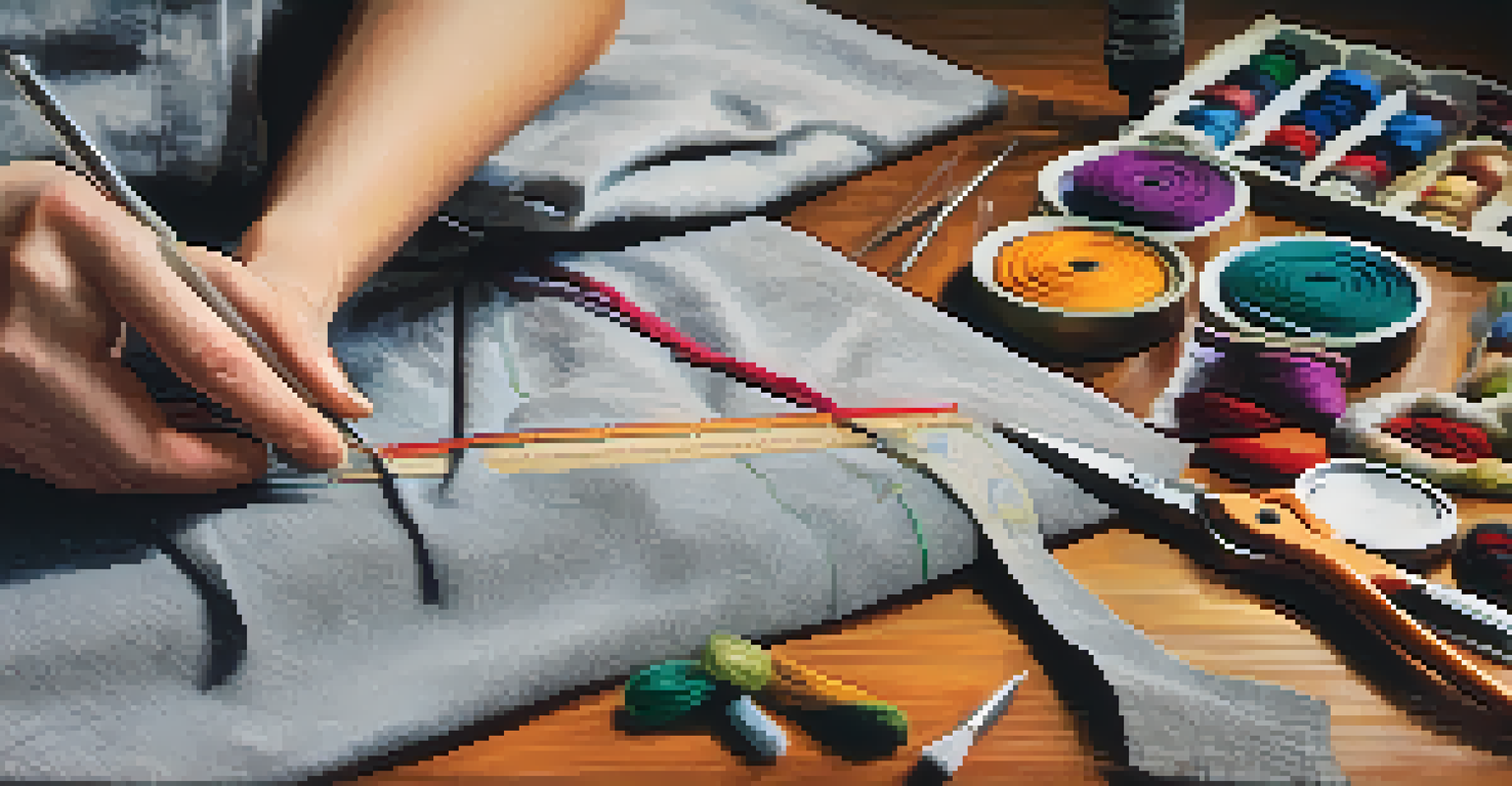Ethical Sourcing and Fashion Supply Chain Management

What is Ethical Sourcing in Fashion?
Ethical sourcing refers to the process of ensuring that the products we consume are produced in a way that is fair to workers, environmentally sustainable, and socially responsible. In fashion, this means considering the entire journey of a garment, from raw materials to the final product. By prioritizing ethical sourcing, brands can foster a positive impact on communities and the planet, while also appealing to increasingly conscious consumers.
Ethical sourcing is not just a trend; it can be a viable business model.
For instance, when a fashion brand chooses to source cotton from farms that provide fair wages and safe working conditions, it not only supports the farmers but also builds trust with its customers. This transparency in sourcing can make a significant difference in how a brand is perceived in the marketplace. Ultimately, ethical sourcing is about aligning a brand's values with the expectations of its consumers.
Moreover, the rise of fast fashion has prompted a critical examination of sourcing practices. Many brands are now adopting ethical sourcing as a core principle, ensuring their supply chains prioritize human rights and environmental stewardship. As consumers become more aware of the implications of their purchases, brands must evolve to meet these ethical standards.
The Role of Supply Chain Management
Supply chain management (SCM) plays a crucial role in ethical sourcing, as it encompasses all the steps involved in bringing a product from concept to consumer. Effective SCM ensures that every stage of the supply chain adheres to ethical practices, from material sourcing to manufacturing and distribution. This holistic approach allows brands to identify potential ethical risks and address them proactively.

For example, a brand may implement strict guidelines for its suppliers, mandating fair labor practices and environmental protections. By fostering relationships with suppliers who share these values, companies can create a more resilient and ethical supply chain. This not only helps mitigate risks but also enhances the brand's reputation in the eyes of consumers.
Ethical Sourcing Benefits Brands
Prioritizing ethical sourcing fosters trust and loyalty among consumers by aligning brand values with their expectations.
Additionally, advancements in technology are transforming supply chain management. Tools like blockchain can enhance transparency and traceability, allowing brands to verify the ethical practices of their suppliers more effectively. This shift towards more accountable supply chains is crucial for building consumer trust and loyalty.
Challenges in Ethical Sourcing
Despite the growing focus on ethical sourcing, many challenges remain. One significant hurdle is the complexity of global supply chains, which often involve numerous suppliers and subcontractors. This complexity can obscure visibility, making it difficult for brands to ensure that all parties comply with ethical standards.
Transparency is the currency of trust in today's fashion industry.
Moreover, the cost associated with ethical sourcing practices can be a barrier for many brands, particularly smaller businesses. Implementing fair labor practices and sustainable materials often requires upfront investments that may not yield immediate returns. Consequently, some brands may hesitate to fully commit to ethical sourcing, fearing it could impact their bottom line.
However, overcoming these challenges is essential for the long-term viability of the fashion industry. By prioritizing ethical sourcing, brands can not only differentiate themselves in a crowded market but also contribute to a more sustainable future. Engaging consumers with stories about their sourcing practices can also foster a deeper connection and loyalty.
The Impact of Consumer Awareness
Consumer awareness has skyrocketed in recent years, with many shoppers actively seeking brands that align with their values. This shift in consumer behavior has prompted fashion brands to rethink their sourcing strategies and prioritize ethical practices. Today, more than ever, consumers are willing to pay a premium for products that are sustainably and ethically sourced.
For instance, brands that share their sourcing stories through social media and marketing campaigns often resonate more with consumers. By highlighting the positive impact of ethical sourcing—such as fair wages for workers or reduced environmental impact—brands can build trust and loyalty among their audience. This connection can turn one-time buyers into lifelong supporters.
Consumer Awareness Drives Change
As consumers increasingly seek ethically sourced products, brands are compelled to adapt their sourcing strategies to meet this demand.
Furthermore, as consumers become more educated about the implications of their fashion choices, they are demanding greater accountability from brands. This pressure can lead to significant changes in the industry, pushing more companies to adopt ethical sourcing as a standard practice rather than an exception.
Successful Examples of Ethical Sourcing
Several fashion brands have successfully implemented ethical sourcing practices, setting examples for others to follow. For instance, Patagonia has long been a leader in sustainable fashion, focusing on environmentally friendly materials and fair labor practices throughout its supply chain. Their commitment to transparency and social responsibility has garnered a loyal customer base that values ethical consumption.
Another notable example is Everlane, which champions a 'Radical Transparency' model. They disclose the true cost of each product, detailing how much goes to materials, labor, and their markup. This level of transparency not only builds consumer trust but also encourages other brands to adopt similar practices in their sourcing strategies.
These success stories illustrate that ethical sourcing is not just a trend; it can be a viable business model. By prioritizing ethical practices, brands can cultivate a positive brand image and attract conscious consumers who are increasingly looking for meaningful purchases.
Future Trends in Ethical Sourcing
The future of ethical sourcing in fashion is bright, with several emerging trends indicating a shift towards more responsible practices. One trend is the increasing use of technology, such as artificial intelligence and blockchain, to enhance transparency and traceability in supply chains. This technological innovation can help brands monitor their supply chains more effectively and ensure compliance with ethical standards.
Additionally, collaboration among industry players is becoming more common. Brands, NGOs, and governments are joining forces to share best practices and create guidelines for ethical sourcing. This collective effort can lead to more significant change across the fashion industry, as stakeholders work together towards common goals.
Challenges in Ethical Sourcing
The complexity of global supply chains and associated costs pose significant hurdles for brands looking to implement ethical sourcing practices.
Lastly, the circular economy is gaining traction, promoting the idea of reusing and recycling materials to minimize waste. Fashion brands that embrace this model will not only reduce their environmental impact but also appeal to a growing demographic of eco-conscious consumers.
How Consumers Can Support Ethical Sourcing
Consumers play a vital role in promoting ethical sourcing practices in the fashion industry. One of the simplest ways to support ethical fashion is to be mindful of purchasing decisions. By researching brands and choosing those that prioritize sustainable and ethical practices, consumers can drive demand for responsible sourcing.
Additionally, advocating for transparency can encourage brands to adopt ethical sourcing. By asking questions about sourcing practices and sharing information on social media, consumers can hold brands accountable and push for more ethical practices. This collective voice can influence companies to prioritize ethical sourcing as a core principle.

Furthermore, supporting local and small businesses that focus on ethical sourcing can make a significant difference. By investing in these brands, consumers not only contribute to their success but also help foster a more sustainable fashion ecosystem overall.